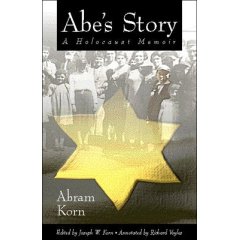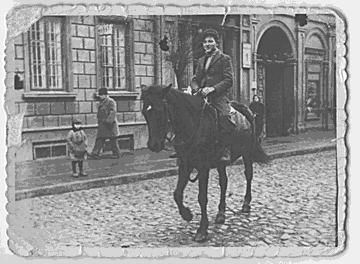Imagine What It Was Like To ...
Be Rescued from a WWII Concentration Camp:
Powerful Excerpt of a Holocaust Survivor Story
The Background
All such stories are profound and moving, but Abram Korn's holocaust survivor story is one that is particularly so. He was 16 when the Nazis invaded his hometown of Lipno, Poland, on September 1, 1939 -- the very first day of World War II. He survived the entire war as a Jewish prisoner, enduring the ghettos, the horrific concentration camps, and the Death March from Auschwitz. |
| Abe Korn before the war in Lipino, Poland |
Astoundingly, Abe kept his sense of human dignity--with gangrenous feet he struggled to stay on the healthy-workers list; with scant supplies he bargained for food and coal and helped others survive. Abe always believed he could live one more day, and on April 11, 1945, when the Buchenwald camp was liberated, he was finally free.
After Liberation, Abe focused on going to school and earning a living in Germany. He married and moved to the United States, where he and his wife raised a family and built a successful automotive business.
By the time Abe died in 1972, he had almost completed a rough first draft of his memoirs. His eldest son, Joseph, recently prepared Abe's manuscript for publication. Abe's Story: A Holocaust Memoir was released on April 11, 1995, the fiftieth anniversary of his liberation from Buchenwald Concentration Camp.
was released on April 11, 1995, the fiftieth anniversary of his liberation from Buchenwald Concentration Camp.
For modern readers seeking the best in Holocaust literature and riveting drama, Abe's Story is an incredible story of hope, of the human potential to do good in the face of horrible evil. All who read Abe's Story seem to apply it to their lives today. It is a holocaust survivor story that will inspire people to persevere, despite any obstacles in their paths.-- From www.Remember.org
The Excerpt from Abe's Story: A Holocaust Memoir On the afternoon of April 11, 1945, I was resting in my barracks. My body was extremely weak from fighting off my foot infection without nourishment or medical attention. I heard something that I couldn't quite believe. I raised my head to listen. Was it my imagination? Was I losing my mind? I heard singing. The singing became louder and more distinct.
On the afternoon of April 11, 1945, I was resting in my barracks. My body was extremely weak from fighting off my foot infection without nourishment or medical attention. I heard something that I couldn't quite believe. I raised my head to listen. Was it my imagination? Was I losing my mind? I heard singing. The singing became louder and more distinct.The huge barracks stable door now swung open. I finally believed my ears because my eyes saw a sight I shall never forget. I beheld a miracle. Some of the same German SS officers from whom we had taken orders but moments before, now marched into our barracks with their hands and bodies bound in rope.
Some of my fellow prisoners were pricking them and goading them with the Nazis' own rifles and bayonets. They shouted to the Nazi officers, "Aren't you proud of your accomplishments?" as they pointed to the half-dead bodies that lay on the wooden shelves in our barracks.
Fear replaced German pride and authority. With this wonderful turn of events, we saw German SS officers cringing before former Jewish prisoners. They must have asked themselves, "What will the future bring for us now?"
Behind the singing prisoners came the American soldiers. It was unbelievable, but it was true. We had done everything in our power to stay alive long enough to see Liberation, despite so many designed traps to annihilate us. We were finally seeing the miracle happen.
The American soldiers stood there like giants, in their net-covered helmets and camouflage uniforms. Seeing them look upon us with heart and feelings turned the clock back to my childhood--I was human again. They assured us that everything would be all right.
We had had to keep stiff upper lips and dry eyes through many years of persecution, of being pushed around, of hunger and deprivation beyond description, of whippings and psychological torture, of being treated worse than animals. We had learned to shut down our emotions and our pain, to turn off our tears. We had ceased to be human.
We now began to feel again, to react again, to be human again. We had been resurrected--brought back from a life worse than death--and our American heroes were there before our eyes. All I could do was cry and cry and cry, and I was not alone. Prisoners and soldiers cried together.

